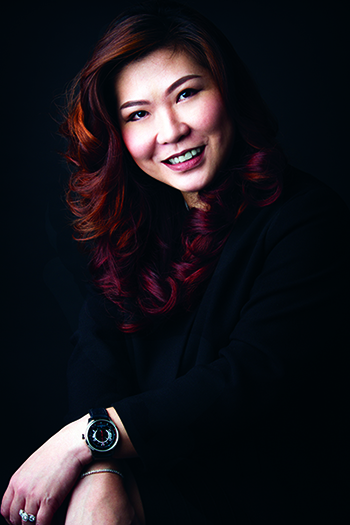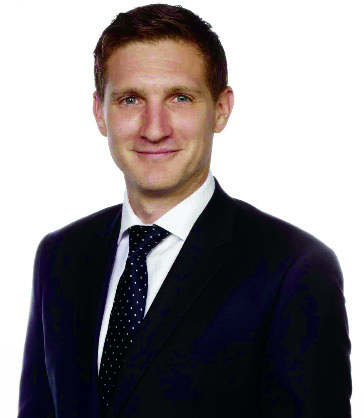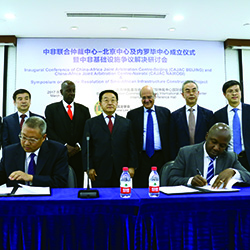Singapore’s Maxwell Chambers is an integrated dispute resolution complex housing best-in-class hearing facilities and support services, as well as top international alternate dispute resolution (ADR) institutions. We spoke to its chief executive about expansion plans and Singapore’s role as an ADR hub.
ASIAN-MENA COUNSEL: Can you tell us about Maxwell Chambers’ expansion plans and how they are progressing?
Katherine Yap: It is a very exciting period for us as we are expanding our premises to occupy the adjacent conservation building at 28 Maxwell Road. The expansion will add 120,000 square feet of floor space and triple our current size. This will help to support the growth of dispute resolution institutions in Singapore and capture more opportunities in the sector in Asia.
Restoration works are expected to begin in June 2017 and the estimated date of completion is in the first quarter of 2019.
AMC: The new premises are in a historic building, but will presumably feature state-of-the-art technology. What can tenants expect?
KY: The new premises aims to provide world-class offices housing both the top international and local law practitioners as well as business facilities for tenants. These include the exclusive usage of the meeting rooms, secretariat services and a 24-hour business centre. One key point differentiating the new premises from other office spaces would be the exclusive lounge for tenants, which would provide them with a space to unwind and network.
Upon completion of the new building, the current premises at 32 Maxwell Road will be dedicated to hearing and preparation rooms for commercial dispute resolution cases. An overhead link-bridge will also be constructed for seamless access between our existing building and the new premises.

Katherine Yap
AMC: What is driving the need for expansion?
KY: Singapore is becoming an increasingly popular destination for international corporate arbitration in Asia. As such, Maxwell Chambers has been registering steady growth in the number of arbitration cases held on its premises over the years.
Furthermore, there has been a significant increase in the number of enquiries on tenancy opportunities at Maxwell Chambers. With this rise in demand for hearing rooms and tenant space, we believe that the expansion of Maxwell Chambers is timely.
AMC: How is Singapore developing its position as a regional ADR hub and how will the Civil Law (Amendment) Bill and the Mediation Bill affect this?
KY: Established in January 2015, the Singapore International Commercial Court (SICC) won much praise for its first written judgement issued last year. Thus, the legal community is generally optimistic about its potential and I believe that the complementary relationship between SICC and the Singapore International Arbitration Centre (SIAC) would help to drive more international corporate work into Singapore.
While Singapore is one of the top five most preferred seats of arbitration worldwide, there is a need to stay responsive and constantly adapt. The Civil Law (Amendment) Bill 2016 provides a framework for third-party funding in Singapore, and third-party funding has been a feature in other leading arbitration centres. The Bill will hence allow Singapore to stay ahead of the trends and level the playing field, thereby allowing international businesses which arbitrate in Singapore to make use of financing and risk management tools.
Similarly, the Mediation Bill provides a new legislative framework for mediation by strengthening the enforceability of a mediated settlement agreement and providing certainty for cross-border mediation users. The provisions of this Bill aim to draw more international commercial mediation work to Singapore and further strengthen Singapore’s position as an international dispute resolution hub.
I would say that the Civil Law (Amendment) Bill 2016 and the Mediation Bill indicate the growing sophistication of the ADR market in Singapore. And it is definitely a positive sign that Singapore is not resting on its laurels amid the globalisation of markets.
AMC: What are Singapore’s unique selling points as an ADR venue?
KY: First and foremost, Singapore’s advantage lies in its geographical location. It is situated in the dynamic and fast-growing Asia-Pacific region and is closely linked to the major economies of China and India.
Well-known internationally for its impartiality and neutrality, Singapore has established itself as a trusted location for high-quality cross-border dispute resolution. According to the World Economic Forum’s Global Competitiveness Report 2016-2017, Singapore is ranked the most transparent and least corrupt country out of 138 economies. While Singapore’s legal system, which is based on the British common law system, is highly regarded, we are also known to have excellent infrastructure for dispute resolution.
With our stellar reputation as a one-stop establishment that provides world-class facilities and houses top global ADR institutes under one roof, Maxwell Chambers is attracting even more organisations to settle their disputes in Singapore. In fact, Maxwell Chambers is recognised by many in the legal fraternity to have best-of-class hearing rooms and preparation rooms with an extensive support system to complement the requirements of arbitration hearings.
AMC: To what extent does Singapore compete with Hong Kong as an ADR venue?
KY: While Singapore and Hong Kong appear to be the two most popular Asian seats for arbitration in recent years, it would not be fair to make a direct comparison between the two countries. The ultimate choice of hearing centre is dependent on several factors, including the type of disputes, the nationality of the parties and the seat of the hearing.
On our end, Maxwell Chambers is constantly striving to improve its services. I believe that the standard of service quality and the set-up of the arbitration centre differentiates us from the rest of the competition. Our diligence in keeping up with technology and corporate knowledge also provides us with an edge in
this industry.
AMC: Do you see Maxwell Chambers embracing virtual courts or online ADR in the coming future?
KY: Maxwell Chambers currently offers video-conferencing and tele-conferencing facilities, which are often requested by international clients. With the rapid advancement of technology, online mediation and arbitration is definitely a sector we are keen to explore in the coming future.
However, as Maxwell Chambers’ core business lies in its state-of-the-art hearing facilities, our main focus will still be on offering these facilities for physical hearings. At the same time, we keep abreast of the latest developments in technology and are on a constant lookout for new opportunities and partnerships to ensure that we stay ahead of the pack.
Our recent collaboration with Opus 2 International would be a good example of our commitment to continuously upgrade the services available at Maxwell Chambers. Besides offering preferred transcription services to clients, Opus 2 will also provide the option of its internationally-acclaimed Opus 2 Magnum cloud platform to the legal parties and arbitral panels engaged in hearings at Maxwell Chambers.
AMC: What significant changes have you seen in the seven years since Maxwell Chambers has been active?
KY: We have seen a steady growth in the number of cases held at Maxwell Chambers over the years, and it is largely due to Singapore becoming an increasingly popular destination for international corporate arbitration in Asia.
The expansion of our premises is driven by this demand for a world-class dispute resolution complex, and I trust that this expansion will elevate Maxwell Chambers’ position as the one-stop Asia Legal hub with a wide range of legal services offered.
We have also made provision of authentication and certification of arbitration awards seated in Maxwell Chambers. This is in line with our strong belief in bringing added value to our clients.
We are really excited about the developments Maxwell Chambers has in the pipeline for the next three years. While it is going to be an uphill battle, we are certain that we will emerge much stronger and firmly establish Maxwell Chambers as the leader in the industry.
Looking back at the past seven years, we are proud of what we have accomplished, and we look forward to many more years to come.
For more Dispute Resolution Special Report in this issue
 Asia gears up for international arbitration
Asia gears up for international arbitration
Developments across the region are supporting the development of alternate dispute resolution mechanisms that will promote further investment into Asia’s …

Third-party funding in Asia
Asian-mena Counsel speaks to Tom Glasgow, investment manager for Asia at IMF Bentham, about the environment for third-party funding in the region…
 The role of arbitration in promoting Sino-African trade and investment
The role of arbitration in promoting Sino-African trade and investmentIn March, the Beijing Arbitration Commission/Beijing International Arbitration Centre (BAC) and the Nairobi Centre for International Arbitration (NCIA) formally founded the China-Africa Joint Arbitration Centre…



















